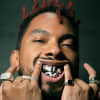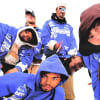 Footnotes is the section in our magazine where we take a deeper look at the music surrounding our feature artists. Read Duncan Cooper’s FADER #83 cover feature on Miguel, and check out our notes below.
Footnotes is the section in our magazine where we take a deeper look at the music surrounding our feature artists. Read Duncan Cooper’s FADER #83 cover feature on Miguel, and check out our notes below.
Miguel, “Adorn” Kaleidoscope Dream (RCA 2012)
With radio formats splintered into a million demographics, it’s hard to predict which pop songs are destined to be those mass-culture smashes that people remember. Something about “Adorn” feels that way, like this might be a song I slow-dance to with my grey-haired boo when I’m 65. That Miguel wrote and produced the song entirely himself is a promising sign for his future pop prospects. When I spent a day with him shooting the cover of this issue in New York, on the eve of the album’s release, an 18-wheeler truck drove by blasting “Adorn” from its speakers; our whole team smiled at real-world proof that everyone loves this song. AF
Miguel, “All I Want Is You” (Live at the FADER Office) (Internet 2011)
In 2011, when Miguel came to our offices for a performance on FADER TV, acoustic guitar in tow, he already had a pretty glittering resume, with a Grammy nomination and songs written for Mary J. Blige and Usher. Really, though, we invited him up because for weeks, it seemed like every time I passed through our lobby to go to the bathroom, I was hearing, and enjoying, “All I Want Is You” played on the radio. That track seemed as much about Salaam Remi’s dusty production as Miguel’s plaintive delivery, but performing solo in our conference room, backed by just his own strumming, Miguel transformed it and put himself dead center. Pulling you close with every bit of elastic tremolo and falsetto wisp, he closed his eyes and you could tell he was picturing himself on a much bigger stage. NZ
Funkadelic, “Maggot Brain” Maggot Brain (Westbound 1971)
Considering Miguel’s knack for channeling unchained emotion into economical melodies, it’s no surprise that he’s a big fan of psychedelic funk pioneers Funkadelic. “Maggot Brain,” the epic track that opens the band’s 1971 opus of the same name, shoots fireworks out of a skeletal arrangement of soft bass, pattering drums and one of the most tormented, scorching, song-length guitar solos in history. Rumor has it that when the band went into the studio to record it, under the influence of LSD, George Clinton told guitarist Eddie Hazel to imagine what it would feel like if he learned that his mother was dead. Clinton’s spoken word passage at the beginning isn’t even necessary—Hazel’s outpouring says it all. EF



